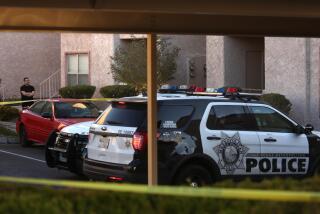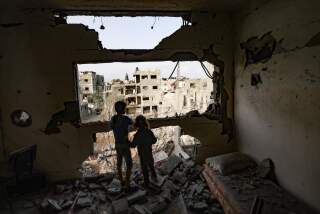Empire Rampage Linked to Financial Setback
- Share via
NEW YORK — New York’s police commissioner and family members in Gaza said Monday that a retired Palestinian college professor who opened fire atop the Empire State Building was not affiliated with any Mideast political groups.
But the Associated Press quoted an unidentified high-ranking police source Monday as saying that the gunman carried a note on him blaming the United States for using Israel as “an instrument” against his people.
The note found in Ali Hassan Abu Kamal’s pocket contains “rambling, angry stuff,” and appears to contradict the claims that the shooting had nothing to do with politics, the source said.
The letter also expressed anger at France and England for using Israel as “an instrument” against Palestinians, and indicated that Abu Kamal planned to vent his anger at the Empire State Building, the source said.
Police Commissioner Howard Safir, while declining to reveal the note’s contents, said the letter “expresses anger and dissatisfaction with a number of individuals, nationalities and occupations.”
Safir said because of the continuing investigation, it would be inappropriate to make public the exact language, but that Abu Kamal “was the victim of his own deranged mental condition.”
The rampage on the building’s observation deck packed with tourists on Sunday left two people dead, including the gunman, and six others in hospitals, some in critical condition.
As the investigation continued Monday, the Empire State Building--one of the nation’s top tourist attractions visited by 3 million sightseers a year--was fitted with metal detectors and baggage scanners like those used by airports. The 86th-floor observation deck is expected to reopen today when people seeking admission will be screened.
*
In Gaza City, relatives of Ali Abu Kamal theorized that the 69-year-old English teacher had acted out of frustration because he felt cheated after losing his life savings in the United States.
He called home Sunday, before beginning his attack, and said, “If something happens to me--because I’m an old man and very far away--you should ask about me at this telephone number,” he told his oldest daughter, Linda, giving her the number of a friend in New York.
A few days earlier, he called his wife, Fathiya, and asked her to send tuition to a son studying civil engineering in Russia. She asked why he didn’t send the money himself.
“He told her, ‘I have nothing. I have lost all my money,’ then hung up the phone,” his daughter said.
Other family members said that Abu Kamal had no ties to Palestinian militants and may have been unable to cope with the failure implicit in his loss of money.
Safir said an investigation by a joint FBI/NYPD terrorist task force so far had found “zero” evidence that Abu Kamal was affiliated with any terrorist group.
“He was very distraught over a number of financial reverses in which he felt he had been cheated out of his life savings and this caused him to be in a very depressed emotional state,” Safir said.
The commissioner said investigators were told that Abu Kamal had lost between $400,000 and $500,000. Some relatives in Gaza estimated the figure at $300,000. Neither Safir nor Abu Kamal’s family could immediately explain the circumstances of the loss.
Security cameras showed that Abu Kamal apparently hid the 14-shot Beretta automatic pistol he carried to the observation deck under his coat.
The teacher for 50 years gave no warning when he opened fire, killing Christoffer Burmeister, 27, of Gjoel, Denmark, a member of the Bush Pilots rock group. The musician was pronounced dead at the scene. After wounding the others, some gravely, Abu Kamal shot himself in the head. He died five hours later at Bellevue Hospital.
Safir said that Abu Kamal had purchased the weapon in Melbourne, Fla., at the end of January after entering the United States last Christmas Eve.
After arriving in New York, he traveled to Miami, and on Jan. 11 checked into a motel that charges $120 to $175 a week in Melbourne. Police said Abu Kamal used the motel’s address to establish Florida residence so he could buy the gun several days later.
New York Mayor Rudolph W. Giuliani denounced the ease with which Kamal made the purchase and called for strict, uniform gun laws in the United States.
In Gaza City, Abu Kamal’s relatives erected a white canvas “house of mourning” outside his home Monday in the comfortable Ramal district.
Inside the one-story home, Abu Kamal’s young nephews poured tiny cups of steaming coffee and offered trays of dates as those who knew the English teacher struggled to understand why he opened fire on the tourists, then fatally shot himself.
“Only, we want the truth,” Marwan Abu Samra, the gunman’s son-in-law, said wearily. “Really, you can’t believe your father, about 70 years old, will do something like this.”
Abu Samra and other relatives said they believed Abu Kamal, who traveled to the United States intent on making a fortune in a business venture, was distraught over losing his life savings. They said he had never been politically active.
Once, several years ago, he was assaulted by Islamic militants who burst into his home in an attack apparently intended as a warning to him to be a better Muslim, his family said. He was beaten, though not seriously hurt, and continued his life as before, they said.
Born in Ramla, inside present-day Israel, Abu Kamal lived in Jaffa on the coast, but became a refugee at 21, evacuating with his family to Gaza when the Jewish state was created in 1948.
He became known as the best English teacher in Gaza, his relatives said, a self-taught man who built a lucrative career and comfortable life for himself and his family.
A disciplined, unemotional man, Abu Kamal seemed to emulate--in his manner, speech and dress--the British officers who ruled the Palestine of his youth, his family said.
*
Family members spoke proudly of his abilities as a teacher and translator, his taste for Shakespeare and other English literature.
But such triumphs were not enough.
“He was very ambitious, very successful,” said Linda Abu Kamal, her face composed but her eyes swollen. “He wanted to improve his life. He said, ‘I want to invest my money, and take all of you to America to give you a better life.’ ”
Abu Kamal’s family said they knew few details of his two-month stay in the U.S., but said such privacy was not unusual for a man who vacationed alone, spending a month away from his family each year in places like Cairo, Cyprus and Turkey.
Family members said Abu Kamal never told them the nature of the business he hoped to build in America or gave them a number to reach him. But until recently, he seemed happy and confident each time he phoned.
Goldman reported from New York and Trounson from Gaza City. Times researchers Lynette Ferdinand and Lisa Meyer also contributed to this story.
More to Read
Sign up for Essential California
The most important California stories and recommendations in your inbox every morning.
You may occasionally receive promotional content from the Los Angeles Times.













